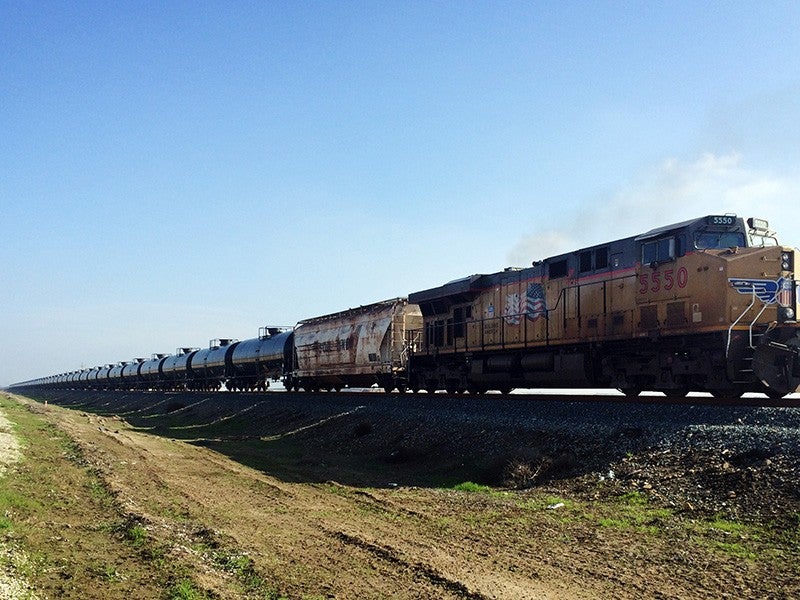Stopping Dangerous Oil Trains from Coming to California
Community activists have been largely successful at preventing catastrophic oil train derailment in California.
In 2014, the State of California convened an Interagency Rail Safety Working Group and produced a report predicting that California was on the cusp of seeing an unprecedented caravan of trains bringing oil into California. The amount of crude oil transported by rail had historically been very small nationwide, including in California. In 2012, only about one million barrels of oil, or .3 percent of total oil imported into California, traveled through the state of California by rail. With land-locked crude oil in Canada and the Bakken region of North Dakota becoming increasingly cheaper than other crude oils, however, there was a rush to provide refineries with access to these new crudes by rail. The report predicted that by 2016, there could be up to 150 million barrels, or 25 percent of total oil imports, moving by rail through California.
This was an alarming prediction: Moving crude oil by train is incredibly dangerous. Derailments of oil trains can be catastrophic. In July 2013, a train carrying Bakken crude derailed and exploded in Lac-Mégantic, Canada, killing almost 50 people and decimating half of downtown Lac-Mégantic. Other major oil train accidents began occurring across the country in Alabama, North Dakota, Pennsylvania, Virginia, Colorado, and Oregon. The Working Group predicted that “the potential for high-consequence incidents” would increase in California, as more oil was predicted to be transported by rail.
But the predicted dystopian future of catastrophic train derailments in California has not come to pass. Instead of the predicted 150 million barrels, only about 2 million barrels of oil arrived by train in 2016. About 3 million barrels arrived in 2017. Although this is more crude arriving by rail than in 2012, it is nowhere near the predicted 150-fold increase.
The reason crude-by-rail imports have not exploded is a collective victory for community activists.
The California Rail Safety Report’s prediction was predicated on six rail infrastructure projects being built. The report’s 2014 predictions are replicated below:
- Bakersfield – Plains All American (under construction): 90 cars per day
- Pittsburg – WesPac Energy Project (planned): 70 cars per day, construction could begin in early 2014 and would reach completion in about 18 months
- Benicia – Valero (planned): 100 cars per day, could be operational by the first quarter of 2015
- Bakersfield – Alon (planned): 200 cars per day
- Wilmington – Valero (planned): 85 cars per day
- Santa Maria – Phillips 66 (planned)
As communities found out about these planned projects, however, they rallied en mass to stop them. They spoke against the projects at public hearings. They submitted extensive testimony and technical comments on the environmental reports for the projects. They tirelessly lobbied their local officials. In most cases public outcry, and the light shed on the startling dangers of these projects, was enough to kill them. Pittsburg – WesPac Energy Project, Benicia – Valero, Wilmington – Valero, and Santa Maria – Phillips 66, were all rejected by public officials or voluntarily canceled by the project applicant after public opposition.
For the two projects actually approved by public officials, community and environmental groups sued, and won. While the Bakersfield – Plains All American is still in operation, local groups were successful in litigation proving that the project illegally evaded public notice and comment. And in the last domino to fall, just this week the Bakersfield – Alon project announced it would not go forward, in response to successful litigation showing that the true rail safety risks of the project were hidden from local officials.
The 2014 report concluded that in order to reduce the risk of a train derailment and explosion in California, we would need stronger federal railroad standards. And better oil tanker upgrades. And more track inspectors. And advanced technology to slow trains before accidents. And lots and lots of local community emergency planning.
But the report missed the most important tool. While these regulatory improvements are still needed across the country, what was really needed to reduce the risk of derailment in California was to stop new crude-by-rail infrastructure projects. And all that took was ordinary folks, wielding the power of the law, taking a stand.
The California Regional Office fights for the rights of all to a healthy environment regardless of where in the state they live; we fight to protect the magnificent natural spaces and wildlife found in California; and we fight to transition California to a zero-emissions future where cars, trucks, buildings, and power plants run on clean energy, not fossil fuels.
